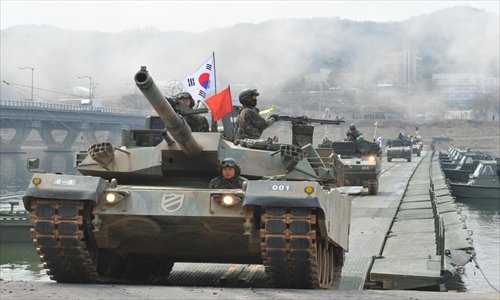NK appoints new premier

North Korea's parliament on Monday appointed former premier Pak Pong-ju to the top cabinet post again, a day after he was named as a member of the top decision body of the country's ruling party.
Pak served as North Korea's premier between 2003 and 2007 and was then believed to have spearheaded a series of economic reforms in the country before he was sacked.
Analysts said the appointment of reform-minded Pak is an indication that Pyongyang is likely to embark on some reforms to rejuvenate its economy, but whether such a drive can really make a difference is in doubt due to North Korea's nuclear ambitions.
Pak was sworn in at the annual meeting of the Supreme People's Assembly, replacing Choe Yong-rim, North Korea's KCNA official news agency reported.
Pak, believed to be in his 70s, is a key ally of Jang Song-thaek, uncle of the top leader Kim Jong-un, Reuters reported.
Pak on Sunday was already named a standing member of the powerful Political Bureau of the Workers' Party of Korea (WPK) Central Committee at a plenary meeting of the party.
Pyongyang might put more focus on building its economy as it has already achieved what it wanted through recent nuclear and missile tests, said Zhang Liangui, a specialist in Korean issues at the International Strategic Research Bureau at the Party School of the Central Committee of the CPC.
"It is an established fact that North Korea is a nuclear-armed country and more importantly, North Korea has made progress in the development of its nuclear weapons and missiles. So for Pyongyang, any talk of the Korean Peninsula's denuclearization now will be meaningless," Zhang told the Global Times.
North Korea's parliament passed laws on Monday to consolidate the country's status as a defensive nuclear state and to establish a national bureau for space exploration.
Lü Chao, director of the Korean Research Center at China's Liaoning Academy of Social Sciences, told the Global Times that the appointment of Pak as premier is a good sign that North Korea's leadership might be interested in economic reforms, but such efforts will be constrained by the country's nuclear ambitions.
Kim announced Sunday at the plenary session of the WPK that the country had decided to adopt a new strategy of simultaneously carrying out economic construction and building nuclear armed forces.
Kim vowed to develop a "self-reliant nuclear power industry" to ease the strain on the country's electricity supply.
"North Korea's continual search for the status of a nuclear state will make it hard to commit a larger share of resources to its economic development," Lü said. "Moreover, how much real power the premier can have is also unknown as the role of North Korea's cabinet is limited due to the country's 'Military First' policy."
The shake-up of North Korea's top leadership also came amid an escalation of saber-rattling on the Korean Peninsula.
South Korean President Park Geun-hye on Monday instructed the country's military to powerfully respond to any possible provocation from North Korea without any political considerations.
"Please carry out your duty of guarding the safety of the people without getting distracted even a bit," Yonhap News Agency quoted Park as saying at the annual policy briefing by South Korea's Defense Ministry.
In his policy briefing to Park, South Korean Defense Minister Kim Kwan-jin also unveiled a new contingency plan of "active deterrence" that allows its military to launch a preemptive strike against North Korea if the North shows signs of an imminent nuclear or missile attack, Yonhap said.
The strong response by South Korea came as Pyongyang sharply ramped up its war rhetoric against the South and the US after North Korea was slapped with fresh UN sanctions on March 7 for its third nuclear test.
North Korea put its missile units on standby to launch strikes against US military bases in South Korea and Japan on Friday after Washington flew the nuclear-capable B-52 and B-2 stealth bombers over the Korean Peninsula for a joint military drill with the South.
But despite North Korea's threats, the US military said Monday it had deployed F-22 Raptor stealth fighters to South Korea to take part in the ongoing "Foal Eagle" war games.
Agencies contributed to this story